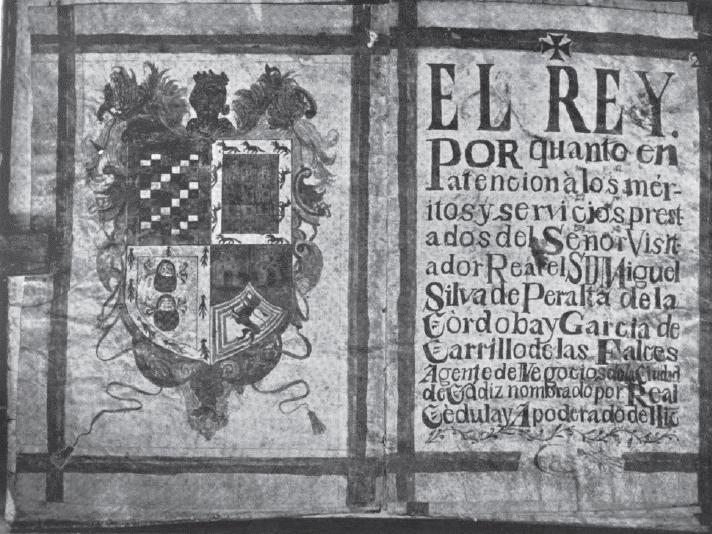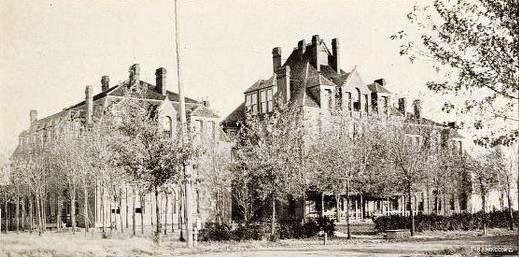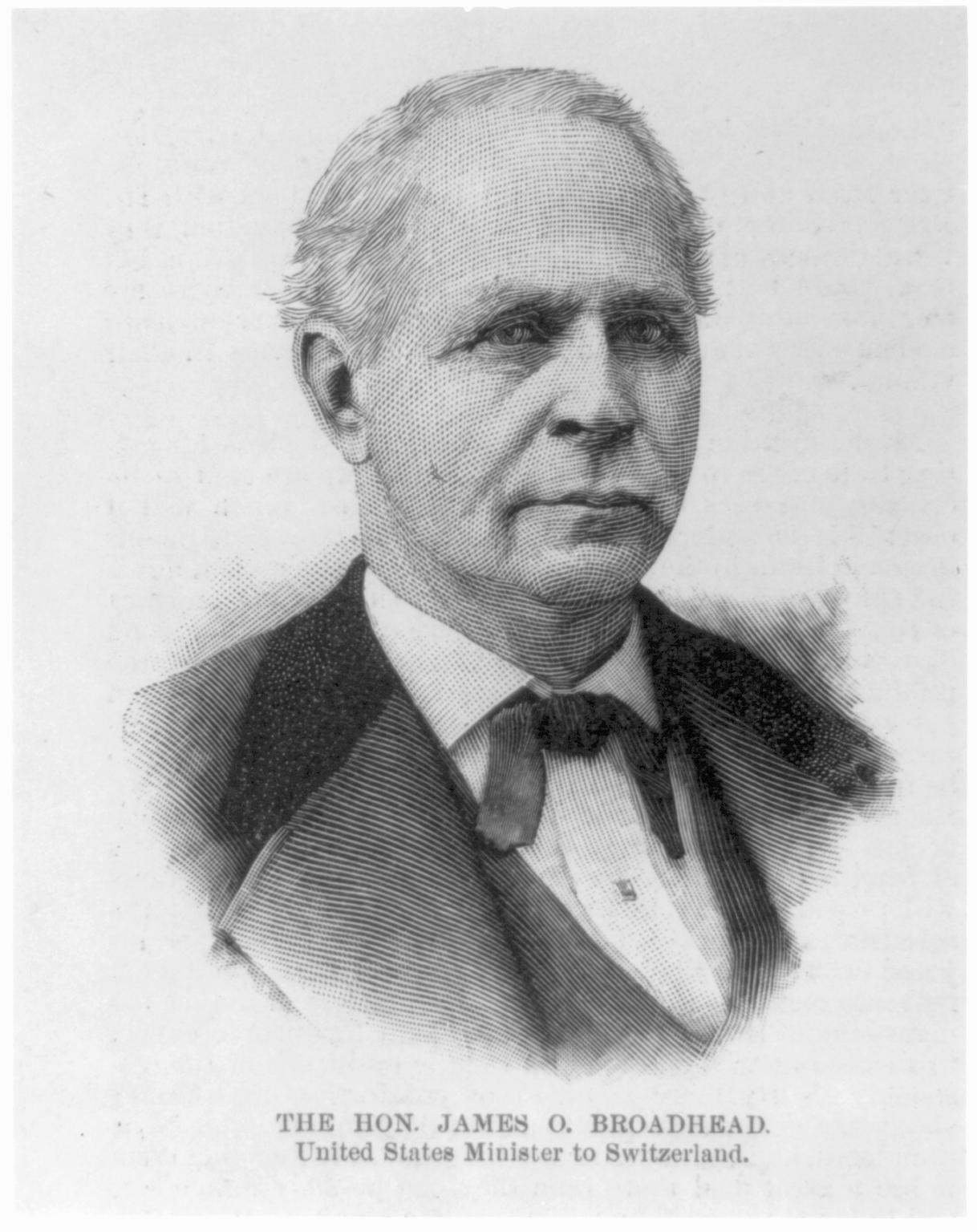|
Baron Of Arizona
James Addison Reavis (May 10, 1843November 27, 1914), later using the name James Addison Peralta-Reavis, the so-called Baron of Arizona, was an American forger and fraudster. He is best known in association with the Peralta land grant, also known as the Barony of Arizona, a pair of fraudulent land claims, which if certified, would have granted him ownership over of land in central Arizona Territory and western New Mexico Territory. During the course of the fraud, Reavis collected an estimated US$5.3 million in cash and promissory notes ($ in present-day terms) through the sale of quitclaims and proposed investment plans. Under the terms of the Treaty of Guadalupe Hidalgo and the Gadsden Purchase, the United States was required to recognize and honor existing land grants made by either the Spanish or Mexican governments. Reavis used this provision by manufacturing a fictional claim and then generating a collection of documents demonstrating how the claim came into his poss ... [...More Info...] [...Related Items...] OR: [Wikipedia] [Google] [Baidu] |
Henry County, Missouri
Henry County is a county located in the western portion of the U.S. state of Missouri. As of the 2010 census, the population was 22,272. Its county seat is Clinton. The county was organized December 13, 1834 as Rives County but was renamed in 1841 for Revolutionary War patriot Patrick Henry. The county originally had been named after William Cabell Rives, who was then serving as a U.S. Senator from Virginia. However, Rives lost popularity in Missouri after he joined the Whig Party. Geography According to the U.S. Census Bureau, the county has a total area of , of which is land and (4.8%) is water. Adjacent counties * Johnson County (north) * Pettis County (northeast) * Benton County (east) * St. Clair County (south) * Bates County (west) * Cass County (northwest) Major highways * Route 7 * Route 13 * Route 18 * Route 52 Demographics As of the census of 2000, there were 21,997 people, 9,133 households, and 6,246 families residing in the county. The population densit ... [...More Info...] [...Related Items...] OR: [Wikipedia] [Google] [Baidu] |
James Broadhead
James Overton Broadhead (May 29, 1819 – August 7, 1898) was an American lawyer and political figure. He was a member of the House of Representatives and of the Missouri Senate, he was also the first president of the American Bar Association.Ross, Kirby ''James O. Broadhead: Ardent Unionist, Unrepentant Slaveholder'', 2002. Retrieved frohereon March 23, 2007 Biography Broadhead was born in Charlottesville, Virginia, and studied law at St. Louis, Missouri, after a one-year stay in the University of Virginia. Having received his licence, Broadhead began a private practice in 1842 at Bowling Green, Missouri.''West's Encyclopedia of American Law'', 1998, retrieved frohereon March 23, 2007 Joining the Missouri Constitutional Convention in 1845, it a year later that he participated in the Missouri House of Representatives. From 1850 until 1853 he also served in the Missouri Senate before returning to private practice as a partner in a law firm back in St Louis. He formed the Commit ... [...More Info...] [...Related Items...] OR: [Wikipedia] [Google] [Baidu] |
Springfield, Missouri
Springfield is the third largest city in the U.S. state of Missouri and the county seat of Greene County. The city's population was 169,176 at the 2020 census. It is the principal city of the Springfield metropolitan area, which had an estimated population of 481,483 in 2021 and includes the counties of Christian, Dallas, Greene, Polk, and Webster, and is the fastest growing metropolitan area in the state of Missouri. Springfield's nickname is "Queen City of the Ozarks" as well as "The 417" after the area code for the city. It is also known as the "Birthplace of Route 66". It is home to several universities and colleges, including Missouri State University, Drury University, and Evangel University. The city is an important center of education and medical care, with two of the largest hospitals in the area, CoxHealth and Mercy, employing over 20,000 people combined, and being the largest employers in the region. It has been called the "Buckle of the Bible Belt" due to its as ... [...More Info...] [...Related Items...] OR: [Wikipedia] [Google] [Baidu] |
Confederate States Army
The Confederate States Army, also called the Confederate Army or the Southern Army, was the military land force of the Confederate States of America (commonly referred to as the Confederacy) during the American Civil War (1861–1865), fighting against the United States forces to win the independence of the Southern states and uphold the institution of slavery. On February 28, 1861, the Provisional Confederate Congress established a provisional volunteer army and gave control over military operations and authority for mustering state forces and volunteers to the newly chosen Confederate president, Jefferson Davis. Davis was a graduate of the U.S. Military Academy, and colonel of a volunteer regiment during the Mexican–American War. He had also been a United States senator from Mississippi and U.S. Secretary of War under President Franklin Pierce. On March 1, 1861, on behalf of the Confederate government, Davis assumed control of the military situation at Charleston, South C ... [...More Info...] [...Related Items...] OR: [Wikipedia] [Google] [Baidu] |
American Civil War
The American Civil War (April 12, 1861 – May 26, 1865; also known by other names) was a civil war in the United States. It was fought between the Union ("the North") and the Confederacy ("the South"), the latter formed by states that had seceded. The central cause of the war was the dispute over whether slavery would be permitted to expand into the western territories, leading to more slave states, or be prevented from doing so, which was widely believed would place slavery on a course of ultimate extinction. Decades of political controversy over slavery were brought to a head by the victory in the 1860 U.S. presidential election of Abraham Lincoln, who opposed slavery's expansion into the west. An initial seven southern slave states responded to Lincoln's victory by seceding from the United States and, in 1861, forming the Confederacy. The Confederacy seized U.S. forts and other federal assets within their borders. Led by Confederate President Jefferson Davis, ... [...More Info...] [...Related Items...] OR: [Wikipedia] [Google] [Baidu] |
Montevallo, Missouri
Montevallo is an unincorporated community in southeast Vernon County, Missouri, United States. The community is on Missouri Route E between Milo (10 miles west) and Olympia four miles to the east in adjacent Cedar County. Nevada is approximately 16 miles to the northeast. History Montevallo was platted in the 1850s. The community was severely damaged during the Civil War. The original town site, located approximately one and one-half miles northwest of the present town, is now known as "Old Montevallo". The entire town was moved to its present location sometime after the Civil War. A post office was established at Montevallo in 1858, and remained in operation until being discontinued in 1968. Montevallo is derived from Italian Italian(s) may refer to: * Anything of, from, or related to the people of Italy over the centuries ** Italians, an ethnic group or simply a citizen of the Italian Republic or Italian Kingdom ** Italian language, a Romance language *** Regional Ita ... words ... [...More Info...] [...Related Items...] OR: [Wikipedia] [Google] [Baidu] |
Romanticism
Romanticism (also known as the Romantic movement or Romantic era) was an artistic, literary, musical, and intellectual movement that originated in Europe towards the end of the 18th century, and in most areas was at its peak in the approximate period from 1800 to 1850. Romanticism was characterized by its emphasis on emotion and individualism, clandestine literature, paganism, idealization of nature, suspicion of science and industrialization, and glorification of the past with a strong preference for the medieval rather than the classical. It was partly a reaction to the Industrial Revolution, the social and political norms of the Age of Enlightenment, and the scientific rationalization of nature. It was embodied most strongly in the visual arts, music, and literature, but had a major impact on historiography, education, chess, social sciences, and the natural sciences. It had a significant and complex effect on politics, with romantic thinkers influencing conservatism, libe ... [...More Info...] [...Related Items...] OR: [Wikipedia] [Google] [Baidu] |
Tanning (leather)
Tanning is the process of treating Skinning, skins and Hide (skin), hides of animals to produce leather. A tannery is the place where the skins are processed. Tanning hide into leather involves a process which permanently alters the protein structure of skin, making it more durable and less susceptible to decomposition and coloring. Before tanning, the skins are dehaired, degreased, desalted and soaked in water over a period of six hours to two days. Historically this process was considered a noxious or "odoriferous trade" and relegated to the outskirts of town. Historically, tanning used tannin, an acidic chemical compound from which the tanning process draws its name, derived from the bark of certain trees. An alternative method, developed in the 1800s, is chrome tanning, where chromium salts are used instead of natural tannins. History The English word for tanning is from medieval Latin , derivative of (oak bark), from French (tanbark), from old-Cornish (red oak). ... [...More Info...] [...Related Items...] OR: [Wikipedia] [Google] [Baidu] |
Spanish People
Spaniards, or Spanish people, are a Romance ethnic group native to Spain. Within Spain, there are a number of national and regional ethnic identities that reflect the country's complex history, including a number of different languages, both indigenous and local linguistic descendants of the Roman-imposed Latin language, of which Spanish is the largest and the only one that is official throughout the whole country. Commonly spoken regional languages include, most notably, the sole surviving indigenous language of Iberia, Basque, as well as other Latin-descended Romance languages like Spanish itself, Catalan and Galician. Many populations outside Spain have ancestors who emigrated from Spain and share elements of a Hispanic culture. The most notable of these comprise Hispanic America in the Western Hemisphere. The Roman Republic conquered Iberia during the 2nd and 1st centuries BC. Hispania, the name given to Iberia by the Romans as a province of their Empire, became highly acc ... [...More Info...] [...Related Items...] OR: [Wikipedia] [Google] [Baidu] |
Scottish People
The Scots ( sco, Scots Fowk; gd, Albannaich) are an ethnic group and nation native to Scotland. Historically, they emerged in the early Middle Ages from an amalgamation of two Celtic-speaking peoples, the Picts and Gaels, who founded the Kingdom of Scotland (or ''Alba'') in the 9th century. In the following two centuries, the Celtic-speaking Cumbrians of Strathclyde and the Germanic-speaking Angles of north Northumbria became part of Scotland. In the High Middle Ages, during the 12th-century Davidian Revolution, small numbers of Norman nobles migrated to the Lowlands. In the 13th century, the Norse-Gaels of the Western Isles became part of Scotland, followed by the Norse of the Northern Isles in the 15th century. In modern usage, "Scottish people" or "Scots" refers to anyone whose linguistic, cultural, family ancestral or genetic origins are from Scotland. The Latin word ''Scoti'' originally referred to the Gaels, but came to describe all inhabitants of Scotland. Cons ... [...More Info...] [...Related Items...] OR: [Wikipedia] [Google] [Baidu] |
Welsh People
The Welsh ( cy, Cymry) are an ethnic group native to Wales. "Welsh people" applies to those who were born in Wales ( cy, Cymru) and to those who have Welsh ancestry, perceiving themselves or being perceived as sharing a cultural heritage and shared ancestral origins. Wales is the third-largest Countries of the United Kingdom, country of the United Kingdom of Great Britain and Northern Ireland. In the Acts of Union 1707, the Kingdom of England and the Kingdom of Scotland merged to become the Kingdom of Great Britain. The majority of people living in Wales are British nationality law, British citizens. In Wales, the Welsh language ( cy, Cymraeg) is protected by law. Welsh remains the predominant language in many parts of Wales, particularly in North Wales and parts of West Wales, though English is the predominant language in South Wales. The Welsh language is also taught in schools throughout Wales, and, even in regions of Wales in which Welsh people predominantly speak English ... [...More Info...] [...Related Items...] OR: [Wikipedia] [Google] [Baidu] |
Clinton, Missouri
Clinton is a city in Henry County, Missouri, United States. The population was 8,792 at the 2020 census. It is the county seat of Henry County. History Clinton was laid out in 1836. The city was named for New York Governor DeWitt Clinton, a key promoter of the Erie Canal. A post office called Clinton has been in operation since 1850. The railroad reached Clinton in 1870, when the Census put the population at 840. Clinton was incorporated as the least-populous type of city in Missouri, a fourth-class city, in 1878. All but one voter voted in favor of incorporation. Resident Banton G. Boone, a Democrat, was Speaker of the Missouri House of Representatives, 1875-1877, and Missouri Attorney General, 1885-1889. Piped water, electricity, and macadam roads were brought in during the 1880s, and a telephone system in the 1890s. In 1905, Clinton and the rest of Henry County held two separate votes on prohibition of alcohol. Clinton's vote was against prohibition, while the rest ... [...More Info...] [...Related Items...] OR: [Wikipedia] [Google] [Baidu] |





